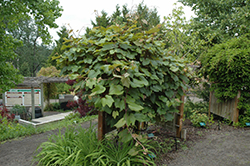Fri & Sat 8am - 8pm
Sun 8am - 7pm
Anytown, USA 12345
fax: 261.787.0463
e-mail: info@successgc.com


Plant Finder

Height: 25 feet
Spread: 15 feet
Sunlight:
![]()
![]()
Hardiness Zone: 6a
Description:
A strong and vigorous vine grown for its beautiful foliage from summer through the fall; produces small inedible black grapes in the autumn; excellent for covering arbors or trellises, trailing walls or fences; needs regular pruning to keep in bounds
Ornamental Features
Crimson Glory Vine has rich green deciduous foliage on a plant with a spreading habit of growth. The heart-shaped leaves turn outstanding shades of orange, scarlet and crimson in the fall. It produces small clusters of black grapes in early fall.
Landscape Attributes
Crimson Glory Vine is a dense multi-stemmed deciduous woody vine with a twining and trailing habit of growth. Its relatively coarse texture can be used to stand it apart from other landscape plants with finer foliage.
This is a high maintenance woody vine that will require regular care and upkeep, and can be pruned at anytime. It is a good choice for attracting birds to your yard. Gardeners should be aware of the following characteristic(s) that may warrant special consideration;
- Spreading
Crimson Glory Vine is recommended for the following landscape applications;
- Mass Planting
- Hedges/Screening
Planting & Growing
Crimson Glory Vine will grow to be about 25 feet tall at maturity, with a spread of 15 feet. As a climbing vine, it tends to be leggy near the base and should be underplanted with low-growing facer plants. It should be planted near a fence, trellis or other landscape structure where it can be trained to grow upwards on it, or allowed to trail off a retaining wall or slope. It grows at a fast rate, and under ideal conditions can be expected to live for approximately 20 years.
This woody vine does best in full sun to partial shade. It prefers to grow in average to moist conditions, and shouldn't be allowed to dry out. It is not particular as to soil type or pH. It is somewhat tolerant of urban pollution. This species is not originally from North America.
